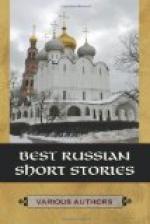Kuprin, the most facile and talented short-story writer next to Chekhov, has, on the whole, kept well to the best literary traditions of Russia, though he has frequently wandered off to extravagant sex themes, for which he seems to display as great a fondness as Artzybashev. Semyonov is a unique character in Russian literature, a peasant who had scarcely mastered the most elementary mechanics of writing when he penned his first story. But that story pleased Tolstoy, who befriended and encouraged him. His tales deal altogether with peasant life in country and city, and have a lifelikeness, an artlessness, a simplicity striking even in a Russian author.
There is a small group of writers detached from the main current of Russian literature who worship at the shrine of beauty and mysticism. Of these Sologub has attained the highest reputation.
Rich as Russia has become in the short story, Anton Chekhov still stands out as the supreme master, one of the greatest short-story writers of the world. He was born in Taganarok, in the Ukraine, in 1860, the son of a peasant serf who succeeded in buying his freedom. Anton Chekhov studied medicine, but devoted himself largely to writing, in which, he acknowledged, his scientific training was of great service. Though he lived only forty-four years, dying of tuberculosis in 1904, his collected works consist of sixteen fair-sized volumes of short stories, and several dramas besides. A few volumes of his works have already appeared in English translation.
Critics, among them Tolstoy, have often compared Chekhov to Maupassant. I find it hard to discover the resemblance. Maupassant holds a supreme position as a short-story writer; so does Chekhov. But there, it seems to me, the likeness ends.
The chill wind that blows from the atmosphere created by the Frenchman’s objective artistry is by the Russian commingled with the warm breath of a great human sympathy. Maupassant never tells where his sympathies lie, and you don’t know; you only guess. Chekhov does not tell you where his sympathies lie, either, but you know all the same; you don’t have to guess. And yet Chekhov is as objective as Maupassant. In the chronicling of facts, conditions, and situations, in the reproduction of characters, he is scrupulously true, hard, and inexorable. But without obtruding his personality, he somehow manages to let you know that he is always present, always at hand. If you laugh, he is there to laugh with you; if you cry, he is there to shed a tear with you; if you are horrified, he is horrified, too. It is a subtle art by which he contrives to make one feel the nearness of himself for all his objectiveness, so subtle that it defies analysis. And yet it constitutes one of the great charms of his tales.




